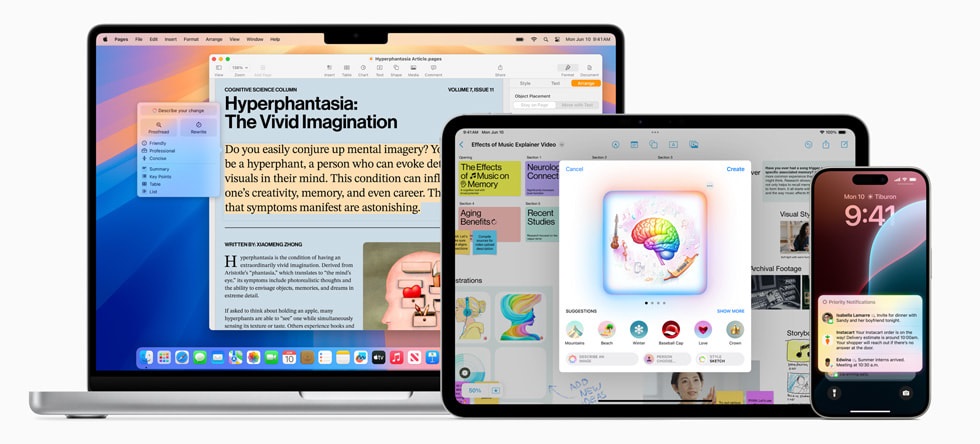

Apple plans to launch its iOS 18.1 update, featuring Apple Intelligence, on October 28, 2024. This date is later than previously anticipated, as Apple aims to ensure a smooth rollout and prepare its AI cloud servers for the expected increased traffic, reports Bloomberg’s Mark Gurman.
The iOS 18.1 update will introduce several new features for iPhone 15 Pro and iPhone 16 users. Key features include advanced text editing tools like rewriting, summarizing, and proofreading; a revamped Siri interface; notification summaries for apps such as Messages and Mail; and a Clean Up tool in Photos that utilizes generative AI to remove unwanted elements from images.
More advanced Apple Intelligence features will roll out in later updates. iOS 18.2, expected in December, will support ChatGPT, an Image Playground, and Genmoji for custom emoji creation. A significant overhaul of Siri, promising improved app control and personalized responses, is anticipated in early 2025.
Apple to Launch M4 Macs and iPad Mini 7 on November 1
Additionally, Apple is expected to announce several new M4 Mac models by the end of October, with some launching as early as November 1, 2024. This line-up includes a new M4 version of the 14-inch MacBook Pro, along with higher-end models featuring M4 Pro and M4 Max chips.
Desktop Macs will also receive updates, including a redesigned Mac mini equipped with M4 and M4 Pro options. The iMac will transition to the M4 chip in this refresh, while a new iPad Mini is expected to debut in early November, marking the first update to the device since its redesign in 2021.
Looking ahead to the first half of 2025, Apple plans to introduce M4-powered 13-inch and 15-inch MacBook Air models, a new iPhone SE with Apple Intelligence, updated 11-inch and 13-inch iPad Air models, and a refreshed AirTag. However, high-end desktop updates, including new Mac Studio and Mac Pro models, are anticipated later in the year.
Apple Shifts Away from Its Annual Release Cycle
Gurman noted that Apple is shifting from its traditional annual product update cycle, potentially resulting in more frequent releases and fewer delays. Historically, Apple launched new products each fall, which helped align employee goals and set analyst expectations.
However, with a broader product range that includes multiple iPhones, iPads, Macs, and AirPods, maintaining a yearly update schedule has become impractical, especially for products like the Apple Watch Ultra and iPhone SE.
Recently, Apple deviated from its fall schedule, launching new iPads in May 2023 and faster Macs earlier in the year. This flexible strategy enables Apple to release products when they are ready, rather than adhering to a fixed timeline. The staggered rollout of Apple Intelligence features, acknowledged by CEO Tim Cook, underscores this approach.
For hardware, Apple has demonstrated that not all products require annual updates. Instead of launching an Ultra 3 watch, the company added a new color option for the Ultra 2 and left the Apple Watch SE unchanged, with updates planned for 2025. Apple’s 2025 strategy includes multiple hardware launches coinciding with significant iOS 18 updates.
To sustain this strategy, Apple must avoid rushing OS features for September releases. This shift could lead to greater innovation and increased revenue outside the holiday season, aligning with its goal of “surprise and delight,” Gurman added.
